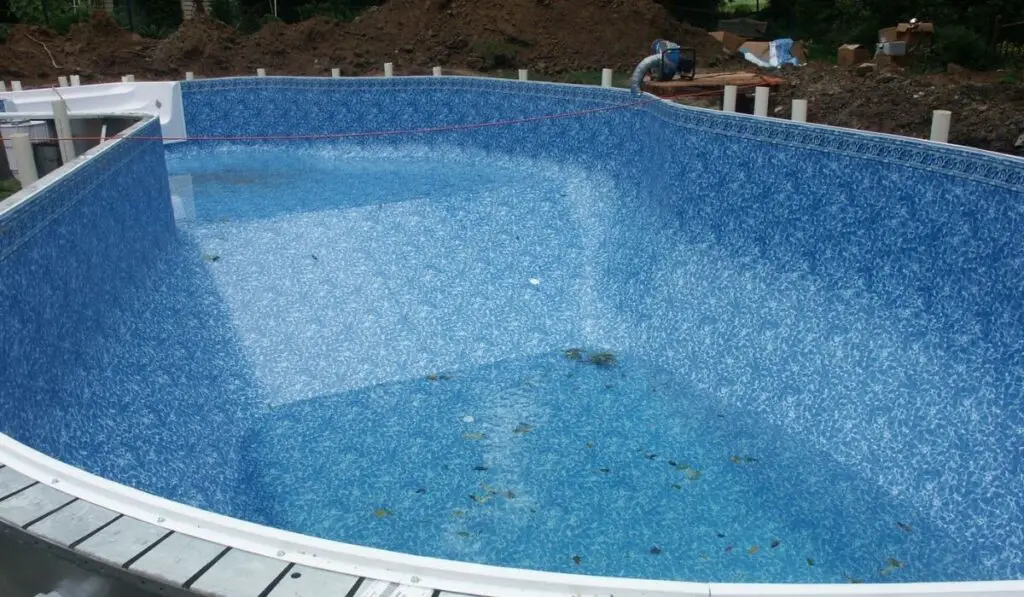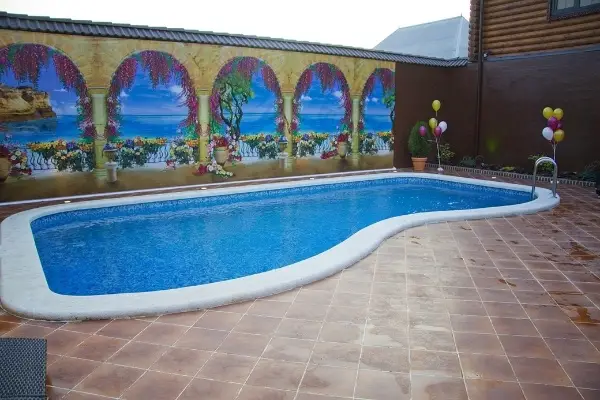While most people have pools that have regular chlorinated water where you add all of the chemicals manually, you might be wondering if it’s possible to use saltwater in a vinyl liner pool. Saltwater produces some of its chlorine naturally and there are many benefits to having a saltwater pool.
You can use saltwater in a vinyl liner pool, for the most part. It depends on whether the walls are steel or polymer. Saltwater corrodes metal, so if you have a steel frame, it may see some erosion over the years. With polymer, there should be no negative effects from using saltwater.
Let’s take a closer look at why you might want to use saltwater in your liner pool and how to maintain a saltwater pool once you’ve got one. The metal corroding is only an issue if the water comes in contact with the metal, which the vinyl liner is meant to prevent, but that said liners do fail or leak sometimes, so, it may be better to not risk this one.
Can You Use Saltwater in a Liner Pool?

In general, there is nothing wrong with using saltwater in a vinyl liner pool. However, if you have a steel framework, you may have to worry about erosion over the years because saltwater corrodes metal.
This is something to consider because you have to spend a significant amount on maintenance, repairs, and even replacing the framework sooner than you might have had to otherwise.
Maintaining a Saltwater Pool
For the most part, maintaining a saltwater pool requires the same things as a chlorine pool. You’ll have to scoop out the debris with a pool net every couple of days or whenever required and you’ll have to add chlorine (on Amazon) to the water to maintain the proper levels.
Mainly people think that because a saltwater pool produces its own chlorine, they don’t have to add any themselves, but that simply isn’t the case.
The saltwater may not produce enough chlorine on its own, so checking the levels is essential. You will also have to shock the pool after bad weather or heavy use to make sure the bacteria is killed off.
Is a Saltwater Pool Better Than a Chlorine Pool?
Whether a saltwater pool is better really depends on what you want and the maintenance you’re willing to do. Let’s take a closer look at the pros and cons of both.
The Pros and Cons of a Saltwater Pool
Saltwater pools have some great advantages. There’s less chlorine in them, so if you’re sensitive to the chlorine, you might find that saltwater is better for your health and feels more comfortable for you. Because the chemicals are less harsh, you also don’t need to worry about discoloration of clothes and hair.
However, you’ll still need to adjust the chlorine levels every week, and saltwater pools do have a higher initial investment. Because they run on electricity, you may also see an increase in your energy bills, especially during peak season.
They’re also quite delicate, which means you won’t be able to do a lot of the maintenance yourself. Instead, you may need to hire a professional to help you out. Overall, saltwater pools are far more costly.
Saltwater, as discussed, may also corrode the steel framework of a pool, which can be a pricey problem.
The Pros and Cons of a Chlorine Pool
One of the main advantages of having a chlorine pool with no saltwater is the initial cost. They’re generally cheaper to install, making them more budget-friendly. They’re also much easier to maintain than a saltwater pool, and most of that maintenance can be done on your own.
However, the chemicals are much harsher, and for those who have respiratory issues, they may find the pool much less comfortable to swim in. The strong smell may also be off-putting.
For those with blonde hair, too much chlorine can even cause discoloration, and it’s been known to wear down swimsuits too! Although saltwater pools also have chlorine, it doesn’t tend to be this harsh.
One other huge pro, however, is that a chlorine pool can be converted to a saltwater pool. That means if you do try out a chlorine pool and decide you’d rather have a saltwater pool, you can go right ahead and get one. More on that in the next section.
Can You Convert a Chlorine Pool to a Saltwater Pool?

It’s actually not too difficult to convert a chlorine pool to a saltwater pool. You may be worried about having to drain the pool and fill it back up, but this isn’t the case at all.
First, you’ll have to test the levels in your water for chlorine, pH, calcium hardness, and heavy metals. You can buy test strips (on Amazon) to make sure everything is at the right level before proceeding with the conversion.
Once you’ve done this, you’ll have to install a saltwater generator in your pool. Make sure you do the research and select the right one based on the size of the pool.
Finally, you’ll have to add pool-grade salt to the water. That’s it! Your chlorine pool has now been successfully converted to a saltwater pool.
